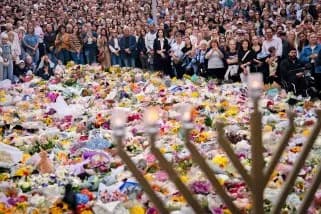Researchers used a mathematical game to examine when people choose to speak out under authoritarian pressure. Their simulations—published in the Proceedings of the National Academy of Sciences—show self-censorship is often strategic, shaped by the chance of detection, punishment severity, and a population-level trait called "boldness." Uniform, sweeping punishments drive widespread silence, while proportional penalties leave room for small acts of dissent. The authors conclude that collective courage is a key factor in sustaining open dialogue.
When Do People Risk Speaking Up Against Tyranny? A Model of Surveillance, Punishment and Boldness

When Do People Risk Speaking Up Against Tyranny?
Population-level surveillance—through mobile phones, social media monitoring and facial-recognition systems—is expanding in the United States and around the world. At the same time, many governments are increasing penalties for dissent, and politicians, activists and protestors are increasingly tracked, detained or otherwise targeted. When such pressures appear in fragile democracies, many people face a strong incentive to silence themselves. What determines whether someone keeps quiet or decides to speak out?
Researchers have created a mathematical game that simulates how authorities and ordinary people make strategic choices in authoritarian settings, trading off the costs of repression against the risks of protest. Their results, published in the Proceedings of the National Academy of Sciences, suggest that self-censorship is often a calculated strategy rather than a simple fear response. Decisions to speak depend on the probability of detection, the likely severity of punishment, and population-level traits—most notably a general tendency toward boldness.
In the model, governing actors could adjust the intensity of surveillance and the severity of penalties to minimize dissent while controlling enforcement costs. Protesters continually weighed the chance of being caught. Each side reacted to the other's moves, and societies that began with lax monitoring or light penalties often saw authorities escalate repression over time.
“A population's willingness to speak out early on, and suffer the negative consequences, has an outsized effect on how long it takes an authority to suppress all dissent,” said Stephanie Forrest, a professor of computing and augmented intelligence at Arizona State University and a co-author of the study. “Punishing an entire society at once is prohibitively costly for rulers.”
How punishments are administered proved important in the simulations. When repression is applied uniformly—for example through broad speech bans or mass internet shutdowns—self-censorship spreads widely. By contrast, when penalties scale with the offense (such as escalating sentences for repeat dissenters), some individuals still take modest risks to express disagreement.
The simulation reflects historical episodes. In 1957, Chairman Mao Zedong launched the "Hundred Flowers Campaign," briefly encouraging critique of the regime. Dissent surfaced quickly, but the campaign was reversed and many critics were later punished, illustrating how opening and then closing space for speech can lead to severe repression.
The model shows that rising surveillance increases self-censorship, yet populations higher in "boldness"—a greater readiness to risk punishment—can prolong resistance. When enough people display that trait, authorities struggle to eliminate dissent entirely, even when repression becomes severe. As the authors write, "The most powerful lever a population has for sustaining dissent is its boldness."
Preserving open public discourse therefore depends not only on the level of surveillance and penalties but also on the courage of individuals and collective willingness to continue speaking despite discomfort. The study underscores important trade-offs for policymakers, human-rights advocates and technologists who weigh surveillance and enforcement against social costs and democratic resilience.
Help us improve.


































